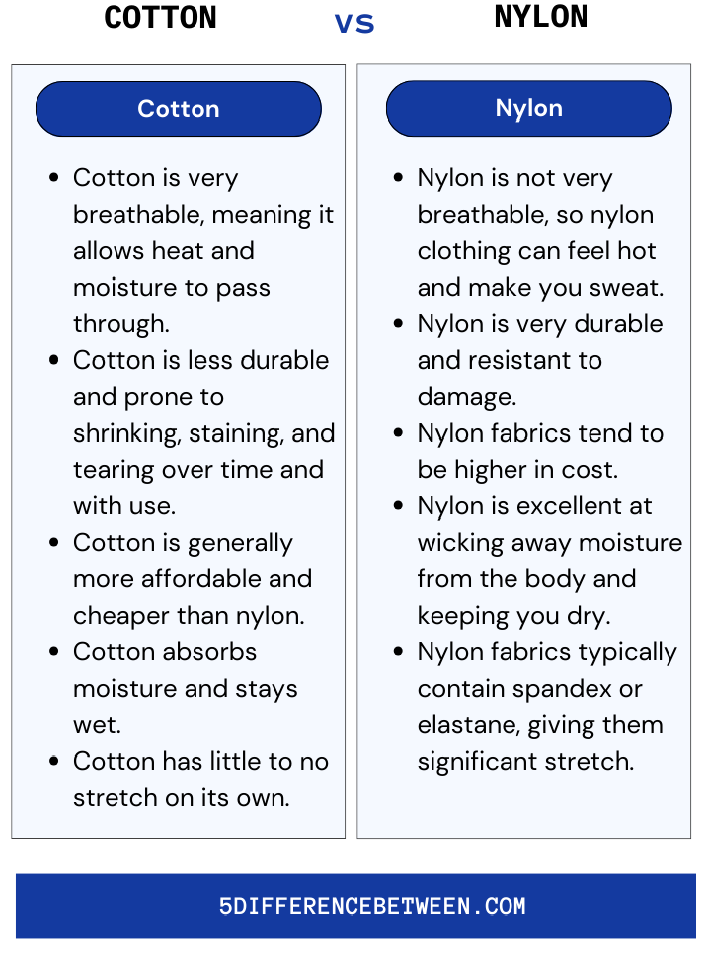Cotton and nylon are two of the most popular fabrics, but they differ in many key ways. Below are the main differences you should know between cotton and nylon.
Origins – The Natural Cotton Plant vs. Synthetic Nylon
Cotton is a natural fiber that comes from the cotton plant, while nylon is a synthetic fiber made from petroleum. Cotton grows on shrubs and has been used for fabric for over 7,000 years. Nylon, on the other hand, was first synthesized in 1935. Talk about old vs. new! Cotton is renewable and biodegradable, as it comes from a plant. Nylon is made from non-renewable petroleum and isn’t biodegradable.
- Cotton needs a lot of water, land, and pesticides to produce, while nylon production requires oil and lots of energy.
- Cotton wrinkles easily and isn’t very durable, while nylon is resistant to wrinkles, abrasion, and mildew.
- Cotton breathes well and is great for hot weather, but nylon doesn’t breathe as well and can feel hot.
- Cotton costs more than nylon to produce, though nylon fabric tends to be more expensive to buy.
As for feel, cotton is soft, lightweight and cozy, while nylon feels slippery and lightweight. Cotton works well for t-shirts, sheets and summer clothes. Nylon is often used for activewear, swimsuits, and carpets.
Also Read > Difference Between DCC and EDC
Depending on what properties are most important for your needs, either natural cotton or synthetic nylon could be a great choice. At the end of the day, it comes down to your priorities and personal preferences.
Breathability and Comfort – Cotton’s Superior Airflow vs. Nylon’s Moisture-Wicking
When it comes to breathability and comfort, cotton has a clear advantage over nylon. Cotton is all about airflow. The natural fibers are extremely breathable, allowing air to circulate and body heat to escape. This means cotton clothes keep you cooler in warm weather and prevent overheating. Nylon, on the other hand, doesn’t breathe as well. It’s less porous and traps heat and moisture next to your skin.
While nylon isn’t very breathable, it is good at wicking away moisture from your body. The synthetic fibers absorb sweat and pull it away from your skin to the outer layer of the fabric, keeping you dry. Cotton absorbs moisture too, but the fibers soak it in instead of transporting it away. So cotton can feel heavy and damp when sweaty, whereas nylon dries much faster.
In the end, it comes down to the level of activity and environment. If you’re in a hot climate or doing intense exercise, nylon’s moisture-wicking abilities may be preferable. But for most everyday situations, cotton’s superior breathability and comfort can’t be beaten. The natural, lightweight feel of cotton against your skin is perfect for lounging, sleeping and casual wear.
So when deciding between these two fibers for clothing and textiles, think about when and how you’ll be using them. Both cotton and nylon have their advantages, you just need to determine what properties are most important for your needs. Comfort or functionality? The choice is yours.
Cotton vs Nylon

Cotton
- Cotton is very breathable, meaning it allows heat and moisture to pass through. This makes cotton clothing comfortable in warm weather and for athletic activities.
- Cotton is less durable and prone to shrinking, staining, and tearing over time and with use.
- Cotton is generally more affordable and cheaper than nylon. For budget-friendly clothing, cotton is usually a better choice.
- Cotton absorbs moisture and stays wet, making it less ideal for exercise.
- Cotton has little to no stretch on its own, though cotton-spandex blends can provide some stretch. For clingy or fitted garments, nylon is superior.
Nylon
- Nylon is not very breathable, so nylon clothing can feel hot and make you sweat.
- Nylon is very durable and resistant to damage, stains, and wear. Nylon fabrics tend to last a long time and hold their shape well.
- Nylon fabrics tend to be higher in cost due to their durability and moisture-wicking properties.
- Nylon is excellent at wicking away moisture from the body and keeping you dry.
- Nylon fabrics typically contain spandex or elastane, giving them significant stretch. This makes nylon clothing form-fitting and flexible.
In summary, while cotton and nylon each have their strengths, they differ remarkably in breathability, durability, cost, moisture-wicking ability, and stretch. Choosing the right fabric for your needs can make all the difference in comfort and performance. Follow Difference Between for more!






